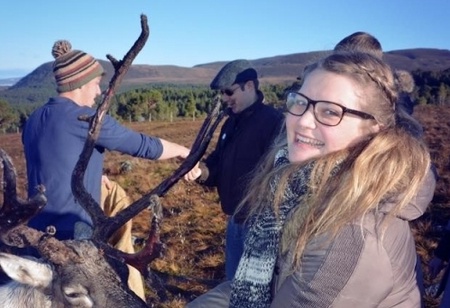The University of Aberdeen will share in a funding boost which aims to grow the UK heritage economy and safeguard heritage for future generations.
£1.7 of investment over 12 years will be provided through the UKRI Arts and Humanities Research Council’s (AHRC) Research Infrastructure for Conservation and Heritage Science (RICHeS) programme to open up access to animal bone reference collections in northern Scotland*.
Known as the ‘Ark of the North’ because of the size, variety and rarity of the specimens, the University of Aberdeen is home to a reference collection of more than 2,000 animal bone samples and the strength of its zooarchaeological research is internationally recognised.
Animal bones provide unique insights into the past including the role that animals held, both as food and as companions, helping us to understand social and cultural practices.
The marks left on bones provide evidence of the tools used during periods of history informing us about food practices and diet and how these changed over time. The study of ancient animal bones can also help scientists better understand how different species evolved and even how their modern counterparts may be better protected by conservation efforts today.
The funding will bring the collections and the archaeologists who study them together in state-of-the-art laboratories within the Zoology building at the University of Aberdeen. It will also enable the appointment of a curator and expert technician to support access to the collections and to further digitisation of the resources.
Currently there is no specialist-staffed comprehensive faunal bone reference collection beyond the central belt in Scotland and the grant will create a centre for excellence in Aberdeen connected to other UK centres in Sheffield and Portsmouth.
Professor Kate Britton, Personal Chair in Archaeology and lead applicant on the successful bid said: “Animal bones provide an important window into our human past and that of our natural world. They can provide detailed insights into past environments and ecosystems, but also tell us about past economies, production, crafting and human-animal relationships.
“The University of Aberdeen’s vast animal bone reference collections are a vital resource for the north of Scotland and the UK.
“This funding will enable us to build upon our strengths in zooarchaeology – the study of animal bones - and expertise in palaeoecology - the study of interactions between organisms and their environments.
“Creating this resource of excellence is important not only for the heritage science community but for artists, creative specialists and social scientists who will explore the collections in different ways.
“The move to the Zoology building will put the University’s zooarchaeologists and osteoarchaeologists – who study human skeletons – in the same research space for the first time. This will facilitate the broader reconstruction of past human and animal lives from evolution and origins, to diet and disease, daily life and death. State-of-the-art resources including laser scanning and 3-D printing which can accurately reconstruct the most fragile of the bones for study will be available within the laboratories.”
Aberdeen zooarchaeologist Dr Edouard Masson-MacLean said: “The new facility will allow us to open up our collections to researchers in Scotland but also across the UK and beyond. 3D scans of rare or unusual specimens can be sent anywhere in the world, allowing us to share this incredible resource at the click of an email.
“The AHRC-supported technical role will be pivotal to helping us to utilise the collections in new ways, to design studies that capture previously hidden information. Some of the material in the Zoology Museum dates back to the 18th century – these bones are like an archive of the ecological and genetic diversity of that time.
“Neil Curtis, head of Museums and Special Collections, added: “The university’s collections of 1,000,000 items are remarkably varied, including items from North-East Scotland and across the world, enabling a wide range of research and teaching, and a variety of opportunities for people in the region and beyond to engage with the life of the university. The University’s Zoology Museum is a great example of being both a popular attraction for local families and visitors to the city, while also being the focus for innovative research.
“The AHRC grant will enable us to draw together museum collections with those in the Archaeology Department to create a dedicated research venue next to the Zoology Museum. We will be able to bring expert knowledge to document the collections and make information available online, store them in facilities to ensure long-term preservation and also enable easy access for research.
“This is a very exciting project, building on close collaboration between academic and professional staff to create the Ark of the North, which will enable further collaboration with collections elsewhere to facilitate novel research and enhance public engagement activities.”
The Aberdeen project is one of 31 to receive support from AHRC under the new scheme.
AHRC Executive Chair, Professor Christopher Smith said: “The UK has a rich and unparalleled cultural heritage and is a global leader in the science of heritage conservation. By investing in heritage science, we are not only unleashing new understanding about our cultural assets but boosting a world-leading heritage economy that will benefit us all.”
ENDS
About the Arts and Humanities Research Council
The first tranche of funding, £527,084 has already been awarded by the Arts and Humanities Research Council [grant number AH/Z505924/1].
About the Arts and Humanities Research Council The UKRI Arts and Humanities Research Council (AHRC) funds internationally outstanding independent researchers across the whole range of the arts and humanities: history, archaeology, digital content, philosophy, languages and literature, design, heritage, area studies, the creative and performing arts, and much more. The quality and range of research supported by AHRC works for the good of UK society and culture and contributes both to UK economic success and to the culture and welfare of societies across the globe.


